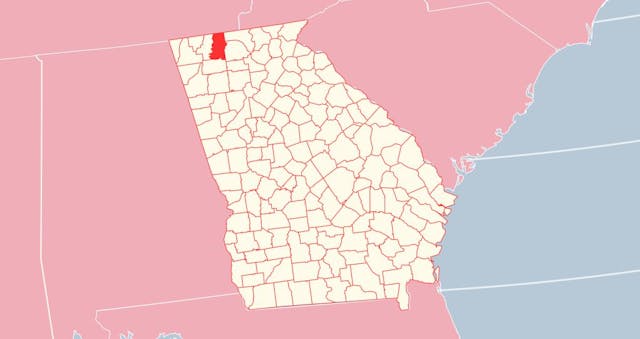Rehabs in Murray
Murray county is located in the northwestern part of the US state of Georgia. Its administrative center is in Chatsworth. According to the 2010 US Census, the region had a population of 39,628. The median age of the residents was 38,8 and the median household income was $51,133.
According to the analysis made by the Centers for Disease Control and Prevention, between 2010-2020, the total number of opioid-involved fatalities in GA increased by 207%. Hence, starting in October 2017, the GA Department of Health and Human Services declared the opioid crisis as a national public health emergency.
In 2020, there were 1,309 drug overdose deaths in this state. As of the survey made by the Institute for Health Metrics and Evaluation (IHME), in 2014 the rate of mental and substance use disorders mortality per 100,000 residents was 22,1 for females and 25,7 for males.
Consequently, the state established several drug and alcohol rehabs in Murray county that are working hard to combat the opioid epidemic through their special therapies. Read the article to get more details on their services and choose a facility that fits your recovery goals.
Available Treatment Services
Murray county rehabs are dedicated to supporting their patients to overcome drug or/and alcohol addiction. Their programs aim to heal the addiction and bring the person to a state of sobriety. To best align with the patient’s recovery goals and medical history, they use individual approaches for each patient. Besides they provide counseling services to help their clients to cope with the relapse triggers.
In brief, you are to find such regional addiction healing services, as detox, inpatient and outpatient plans, aftercare, etc.
Detox
Detox is the process of clearing the body of specific substances. If a person starts to limit the use of a specific substance, he/she may start to experience serious withdrawal symptoms. So, this brings to relapse quickly after they try to get clean and sober.
In other words, expert support during this procedure is vital. The trained staff of the detox center assists the patient to overcome withdrawal symptoms.
Inpatient Plan
This healthcare plan is for people with severe types of dependencies. It offers the most structured and strict form of addiction therapy. That is to say, patients remain at the hub in a safe and monitored environment.
They have 24/7 access to medical and emotional support services. The latter offer cognitive and behavioral therapies, counseling, 12-step meetings, and more. Inpatient clinics may also involve sports, art, yoga, recreational activities, etc.
Outpatient
Outpatient drug rehab is the best place for those who want to continue their recovery course following the end of residential treatment, and for individuals who suffer from moderate dependence.
In terms of scheduling, it offers more flexibility. That is to say, the patient lives in his residence and continues with his daily routine. In other words, these patients should also have a solid network of support outside the clinic.
Aftercare
Addiction recovery is a long-lasting process and requires the coordination of huge efforts. So, even after completing the rehab course person may still need care for a smooth transition to a healthy lifestyle. Moreover, that period is the hardest one, as the risks of relapse are very high.
Aftercare is continuous support that may offer sober living houses, peer support groups, 12-step meetings, etc.
Payment
Thousands of people don’t get expert support because of the high rehab prices. On the other hand, there are several financial options for covering these expenses. First of all, a person may use a private health insurance plan. Secondly, there are also public insurance plans available, such as Medicaid, Medicare, and Tricare.
A person may also enroll in state-funded rehabs with low-cost or no cost at all. Just check your eligibility and apply for professional help. Medical loans, scholarships, and grants are also accessible.

